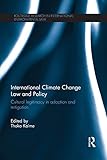International Climate Change Law and Policy : Cultural Legitimacy in daptation and mitigation / edited by Thoko Kaime.
Material type: TextSeries: Routledge research in international environmental lawPublisher: Milton Park, Abingdon, Oxon ; New York, NY : Routledge, 2014Edition: First editionDescription: xi, 228 pages : illustrations ; 24 cmContent type:
TextSeries: Routledge research in international environmental lawPublisher: Milton Park, Abingdon, Oxon ; New York, NY : Routledge, 2014Edition: First editionDescription: xi, 228 pages : illustrations ; 24 cmContent type: - text
- unmediated
- volume
- 9781138666955 (pbk)
- 9780415832236 (hardback)
- 0415832233 (hardback)
- 363.738/74561 KAI 23
- K3585.5 .I58 2014
- BUS099000 | LAW000000 | LAW034000
| Item type | Current library | Collection | Call number | Copy number | Status | Notes | Date due | Barcode | |
|---|---|---|---|---|---|---|---|---|---|
| Reference Book | VIT-AP LAW Section | Reference | 363.738/74561 KAI (Browse shelf(Opens below)) | LA02714 | In transit from VIT-AP to VIT AP School of Law since 2025-03-18 Not For Loan | LAW | 021935 |
Includes bibliographical references and index.
"Climate change poses fundamental and varied challenges to all communities across the globe. The adaptation and mitigation strategies proposed by governments and non-governmental organisations are likely to require radical and fundamental shifts in socio-political structures, technological and economic systems, organisational forms, and modes of regulation. The sheer volume of law and policy emanating from the international level makes it uncertain which type of regulatory or policy framework is likely to have a positive impact. The success or failure of proposed measures will depend on their acceptability within the local constituencies within which they are sought to be applied. Therefore there is an urgent need to better comprehend and theorise the role of cultural legitimacy in the choice and effectiveness of international legal and policy interventions aimed at tackling the impact of climate change. The book brings together experts to present perspectives from different disciplines on the issue of international climate change law and policy. Beginning from the premise that legitimacy critiques of international climate change regulation have the capacity to positively influence policy trends and legal choices, the book showcases innovative ideas from across the disciplines and investigate the link between the efficacy of international legal and policy mechanisms on climate change and cultural legitimacy. The book includes chapters on with a theoretical basis as well as specific case-studies from around the globe. The topics covered include: land use planning as a tool of enhancing cultural legitimacy, indigenous peoples in international environmental negotiations, transnational advocacy networks, community-based forestry management and culture and voluntary social movements"-- Provided by publisher.
"Climate change poses fundamental and varied challenges to all communities internationally. Adaptation and mitigation strategies proposed by governments and non-governmental organisations often require radical shifts in socio-political structures, technological and economic systems, organisational forms, and modes of regulation. The success of these proposed measures hinges on their acceptability within their local constituencies, which underlines the importance of better comprehending the role of cultural legitimacy in the choice of international interventions aimed at tackling the impact of climate change. This book brings together expert perspectives from different disciplines on the issue of international climate change law and policy. Each discussion explores the premise that critiques of the legitimacy of international climate change regulation have the capacity to positively influence policy trends and legal choices. Chapters range from theoretical evaluations to specific case-studies, and include such topics as land use planning, indigenous peoples in international environmental negotiations, transnational advocacy networks, and community-based forestry management. The book will be of great interest to students and researchers of environmental law, international law and environmental studies"-- Provided by publisher.
There are no comments on this title.

